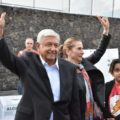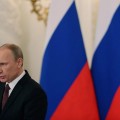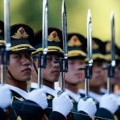
Credit: Terror News Network
The frightening extent of Iran’s’ terrorist reach into the Western Hemisphere is becoming more clear, as law enforcement officials across the globe move to curb Hezbollah.
The Hill reports that Argentinian officials have frozen the assets of 14 people tied to the Barakat clan, a group led by Assad Ahmad Barakat, a top financier for Hezbollah’s Latin American activities. He is considered one of the terrorist organization’s most important financiers.
The Stratfor research group notes that Hezbollah has a strong base of operations on the continent. Its activities are financed by a billion-dollar drug trafficking operation.
The Obama Administration limited its investigatory and enforcement activities against Hezbollah while negotiating the Iran Nuclear Agreement.
The London Center for Policy Research, relying on a Politico’s investigatory article, notes that
“The Hezbollah operation also involved arms trafficking and money laundering. According to the report, cocaine trafficking originated in Latin America, specifically through Venezuela and Mexico … According to U.S. agents involved in the investigation, the criminal operation was directed and planned by Hezbollah’s innermost circle and ‘its state sponsors in Iran…the money collected by Hezbollah went directly toward its military activities in the Middle East…”
“The DEA sought approval to continue investigations, order arrests, extraditions and prosecutions of suspects, and impose financial sanctions on some of the operation’s major players. However, the Departments of Justice and Treasury rejected, delayed, or blocked those requests. Likewise, the State Department rejected requests to pursue cooperation with countries that could have helped target key suspects involved in those criminal activities.”
In November, the Foundation for Defense of Democracies reported that fifteen Hezbollah-linked individuals went on trial in France for laundering millions of euros in South American drug money.
The ultimate goals of the Hezbollah-drug cartel connections are becoming more clear.
The Center for Security Policy notes that “Hezbollah and Iran’s Islamic Revolutionary GuardsCorps (IRGC) have … established a presence in the region, training “soldiers of the revolution” in Venezuelan camps… According to the late Argentinean prosecutor Alberto Nisman, Iran has a presence in 12 countries in the region including Argentina, Brazil, Chile, Colombia, Guyana, Paraguay, Trinidad and Tobago, Suriname, and Uruguay. Iran…also sought a strategic position in the region to increase deterring capabilities against the U.S…
“Moreover, Venezuela issued passports to Iranians and Hezbollah members to facilitate their free travel around the region and the world. Likewise, several Caribbean countries that allied with Chavez established dangerous liaisons with Iran. Guyana signed an agreement with Iran in which Iran would map Guyana’s mineral resources, including uranium. Dominica signed an agreement with Iran that enabled citizens of Iran, parts of the Middle East and Central Asia to obtain a second citizenship and a passport. The islands of St. Kitts and Nevis have also sold passports to Iranians.”
In an analysis released on November 15, The Clarion Project noted that “Iran’s terror proxy Hezbollah is ramping up south of the US border, as witnessed by arrests of its operatives in Bolivia and Peru. Information revealed by the State Department’s top counter terror official Nathan Sales confirmed the increased presence of Iran and Hezbollah in Latin and South America.In Bolivia, “large caches of military equipment and explosives” belonging to Hezbollah jihadis were found in the La Paz area. Jihads have also been dispatched to Peru, where prosecutions of operatives by the government is ongoing. Last year in Paraguay, a number of Hezbollah-linked individuals – some with connections to the U.S. were arrested for money laundering and drug trafficking, according to the State Department. Panama also worked with the U.S. on a number of counter-terror efforts with suspects linked to Hezbollah.”
Frank Vernuccio serves as editor-in-chief of the New York Analysis of Policy and Government.

















Follow Us